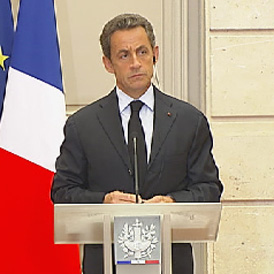Merkel and Sarkozy meet for high-pressure talks
Germany’s Angela Merkel shows unity with France’s Nicolas Sarkozy at a meeting in Paris, urging Eurozone partners to pass laws on deficit reduction, but they say there will be no pooling of debt.
As the region’s debt crisis intensified, the two leaders ruled out issuing so-called eurobonds, urging all 17 eurozone partners to show greater fiscal responsibility by passing laws on deficit reduction by the Summer of 2012.
They also called for better coordinated solutions amounting to a “real economic government”.
“This economic government will be made up of … heads of state and government that will meet twice a year, and more if necessary. It will elect a stable president for two and half years,” President Sarkozy said.
But the French President said there was no need to increase the size of the 440bn eurozone rescue fund.
The two are under pressure to come up with plans to shore up the eurozone and restore financial market confidence after a year and a half of turmoil that has refused to die down despite bailouts of Greece, Ireland and Portugal and the creation of an anti-contagion fund.

Ms Merkel and Mr Sarkozy lead the eurozone’s two biggest economies but are split over how to deal with the crisis, with Berlin against any plan that could see its taxpayers underwriting its struggling eurozone partners’ debts.
However, Germany’s position was clouded by growth figures showing a 0.1 per cent gain in the second quarter and slower first-quarter growth than initially reported.
The news sent stock markets down in London, Paris, Frankfurt, Milan and Madrid.
Meanwhile, France battled to shake off rumours that it might lose its to triple-A credit rating.
Sarkozy has been pushing for a more centralised system of controls across the eurozone, better able in Paris’ eyes to protect against future meltdowns.
Despite German objections, French officials said Sarkozy still intends to urge an “acceleration” of reforms to Europe’s financial institutions and hopes he and Merkel will agree “common positions on the reform of the governance of the eurozone”.
The ECB has resumed buying bonds issued by eurozone members, spending 22bn euros last week to bring the total spent to 96bn euros.
This has pushed down Italy and Spain’s borrowing costs sharply, taking the immediate pressure off as they try to stabilise strained public finances.